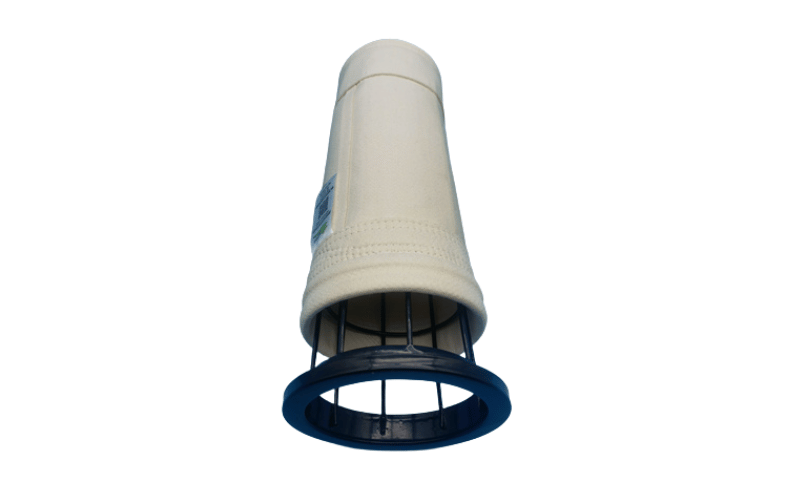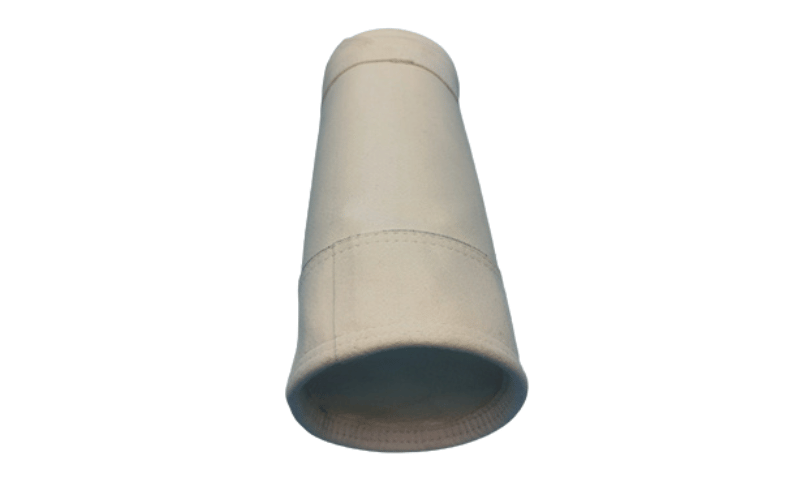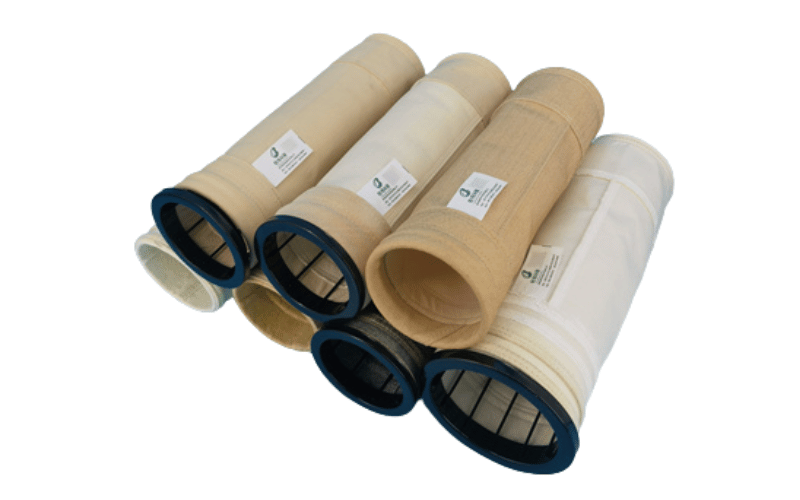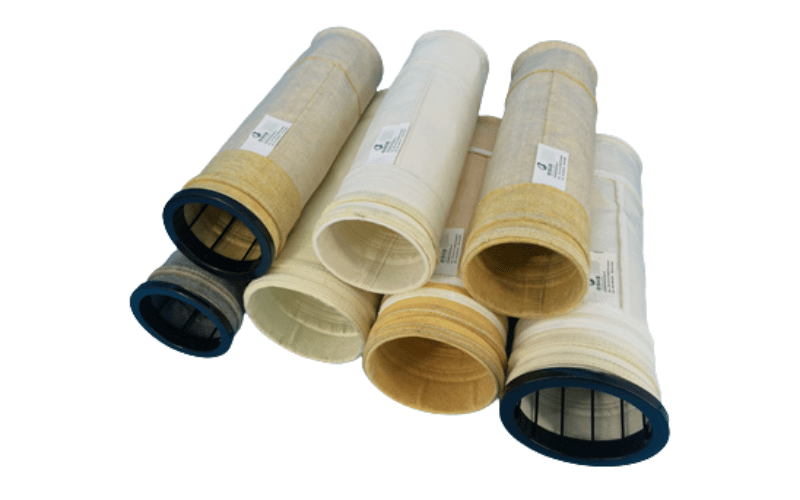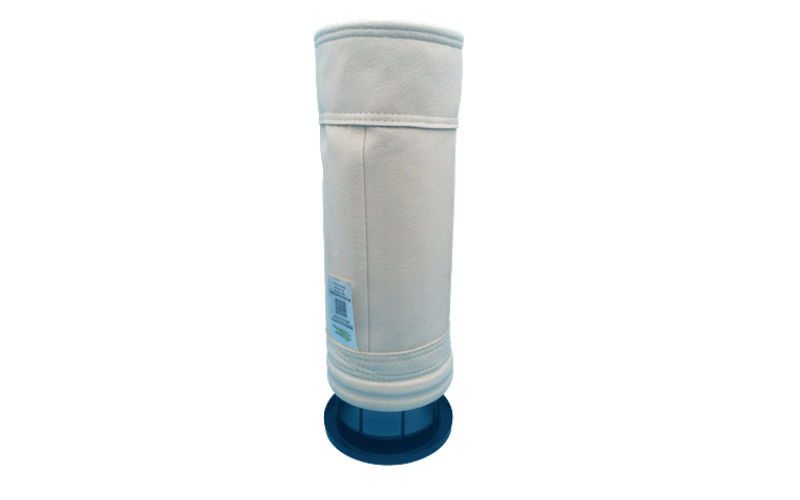PPS Filter Bag
Home » Dust Filter Bag » PPS Filter Bag
Efficient Filtration | Long Service Life | Customizable Options
PPS filter bags are constructed from polyphenylene sulfide (PPS), a material known for its superior heat resistance, chemical resistance, and flame-retardant properties, making them highly versatile in various industries.
With a melting point of 285°C, a tensile strength of 5.0 g/d, a limiting oxygen index of 34, and an operating temperature range of 160°C to 200°C, PPS filter bags offer exceptional performance under extreme conditions. These bags also exhibit excellent resistance to acids, alkalis, and moisture, with advanced stability against hydrolysis. Additionally, PPS material delivers superior thermal durability, making it an effective flame-retardant filter medium. However, PPS filter bags have limited resistance to oxidative conditions and may undergo oxidative corrosion. To maximize their service life, it is essential to avoid exposing them to high-oxygen environments.
Technical Specifications
| Parameter | Specification |
|---|---|
| Name | PPS Filter Bag (Polyphenylene Sulfate Needled Felt) |
| Material | PPS Fiber/PPS Base Cloth |
| Grammage | 500-550 g/m² |
| Air Permeability | 80-100 m³/m²/s |
| Warp Tension | 800-1000 N/5x20 cm |
| Weft Tension | 1000-1200 N/5x20 cm |
| Longitudinal Elongation | <30% |
| Weft Elongation | <30% |
| Operating Temperature | <170°C (Instantaneous 190-200°C) |
| Filtering Air Velocity | 1.0~1.2 m/min |
| Alkali Resistance | Excellent |
| Acid Resistance | Excellent |
| Post-Treatment | Burnishing, Calendering, PTFE Impregnation, or Water and Oil Repellent Treatment |
Key Features and Characteristics
Thermal Resistance
Operating temperature of 170°C, with short-term resistance up to 232°C. The melting point is 285°C, and the oxygen index is 34–35.Chemical and Moisture Resistance
Ideal for use in environments with oxygen levels below 15% and those containing sulfur or sulfur oxides. PPS materials resist acid, alkali, and chemical corrosion effectively.Thermoplastic Properties
The inherent thermoplasticity of PPS fibers enables the creation of heat-sealable filter bags, ensuring a secure and functional bond.High Performance in Cleaning Applications
Performs exceptionally under air-to-cloth ratios of 5:1 during online cleaning and up to 6:1 during offline cleaning processes within the 190°C to 232°C temperature range.
Our PPS filter bags also utilize innovative hot-melt technology for seamless production. This process ensures that the bottom, sides, and collar rings are precisely welded, thereby reducing issues such as bypass leakage, needle hole flaws, or fiber shedding. Advanced digital multi-point welding equipment guarantees secure and consistent welds throughout the product, delivering reliable and high-precision filter bags.
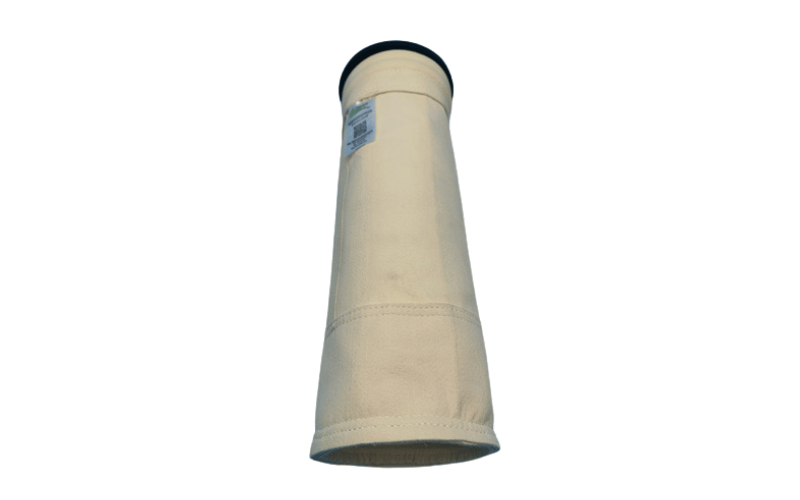
What is a PPS filter bag?
A PPS filter bag is a highly durable filtration solution designed to perform under extreme industrial conditions. Made from polyphenylene sulfide (PPS), these filter bags are renowned for their excellence in heat resistance, chemical stability, and flame retardancy. We manufacture these bags to meet the demanding requirements of industries such as power generation, waste incineration, and chemical processing, offering reliable filtration in challenging environments.
Definition and Composition of PPS
PPS, or polyphenylene sulfide, is a crystalline high-performance thermoplastic polymer known for its remarkable resistance to heat, chemicals, and oxidative environments. The material’s inherent properties make PPS an ideal choice for filtration applications that demand resilience under harsh operating conditions. Our PPS filter bags are constructed using densely woven PPS fibers, equipped to withstand temperatures ranging from 160°C to 200°C while resisting acidic and alkaline corrosion.
What is Polyphenylene Sulfide?
Polyphenylene sulfide is a synthetic polymer with exceptional properties, including a melting point of 285°C, a tensile strength of 5.0 g/d, and a limiting oxygen index of 34. It is characterized by its ability to maintain stability under high temperatures and its resistance to corrosive substances such as sulfur compounds and moisture-laden flue gases.
The success of PPS in filtration media lies in its thermal and chemical durability. It is resistant to hydrolytic degradation and retains its mechanical integrity in conditions unfavorable to many other polymers. We leverage these qualities to create filter bags that deliver long-lasting filtration performance, even in some of the harshest industrial processes.
Key Benefits of PPS in Filtration
- Thermal Stability: PPS filter bags maintain structural integrity and filtration efficiency at high operating temperatures.
- Chemical Resistance: The material withstands exposure to acids, alkalis, and harsh chemicals, making it suitable for diverse industrial applications.
- Flame Retardancy: With a high limiting oxygen index, PPS is inherently non-flammable, adding an extra layer of safety to high-temperature operations.
What are the Applications of PPS Filter Bags?
PPS filter bags serve as an essential component in industrial filtration systems, recognized for their ability to perform reliably under extreme and challenging conditions. These bags are specifically designed for high-temperature and corrosive environments, making them highly versatile in their applications. We engineer our PPS filter bags to meet the needs of various industries, ensuring effective particulate containment, emission control, and system efficiency.
How Does PPS Perform in High-Temperature Environments?
PPS material is renowned for its exceptional performance in high-temperature environments. With an operating temperature range of 160°C to 200°C, PPS filter bags are capable of maintaining their thermal stability and mechanical integrity even under intense conditions. The material’s melting point of 285°C, combined with excellent acid and alkali resistance, ensures consistent filtration in environments where other materials may degrade.
Additionally, PPS fiber’s inherent chemical durability makes our filter bags ideal for applications requiring resistance to sulfur and acidic flue gases. However, PPS has limited oxidation resistance and must be utilized in conditions where oxygen levels remain below 15%. This consideration helps maximize their lifespan and ensures operational reliability.
What Industries Utilize PPS Filter Bags?
Our PPS filter bags are widely adopted across several industries that demand robust filtration solutions. Their versatility allows them to perform effectively in environments characterized by high temperatures, chemical exposure, and stringent regulatory requirements. Key industries include:
Power Generation
PPS filter bags are utilized in coal-fired power plants to manage dust removal and fly ash filtration, ensuring compliance with emissions standards.Waste Incineration
The advanced chemical resistance of PPS filter media makes it suitable for waste incineration plants that require filtration efficiency in corrosive flue gas conditions.Chemical Processing
Industries engaged in manufacturing and processing chemicals benefit from PPS filter bags due to their resilience to acidic and alkaline substances.Cement and Construction Material Production
PPS filter bags are crucial for controlling particulates and emissions in processes such as clinker cooling in cement plants.
By selecting PPS filter bags, industries gain access to a proven solution that balances durability, efficiency, and cost-effectiveness in demanding operational settings.
Can PPS Filter Bags Be Used for Dust Collection?
Yes, PPS filter bags are an exceptional choice for dust collection applications, particularly in environments requiring high-temperature tolerance and chemical resistance. These bags are engineered to capture delicate particulate matter efficiently, achieving ultra-low emissions. Their durability enables them to withstand harsh conditions commonly found in industrial dust collection systems, such as pulse-jet baghouses.
We incorporate advanced manufacturing processes to ensure the reliability of our PPS filter bags for dust collection. For example, hot-melt technology eliminates stitching inconsistencies, reducing the risk of bypass leakage and fiber shedding. Additionally, PPS filter bags demonstrate excellent performance in cleaning systems, handling air-to-cloth ratios of 5:1 during online cleaning and 6:1 during offline cleaning, while maintaining efficiency and service life.
Our PPS filter bags are custom-designed to meet specific operational requirements, making them an ideal solution for industries like coal-fired power plants, cement kilns, and incinerators. By delivering consistent and effective dust containment, our filter bags enable industries to achieve compliance with environmental regulations while maintaining optimal operational performance.
How to Choose the Right filter bag for Your Needs?
Selecting the correct filter bag is vital for ensuring optimal filtration performance and protecting equipment in industrial processes. We understand that various applications require different filtration properties. That’s why our filter bags are designed to meet a wide range of operational demands, offering solutions tailored to the unique requirements of our clients.
What Factors Influence Filter Fabric Selection?
Choosing the right filter fabric depends on several critical factors, as each process brings its own set of challenges. Here are the key considerations:
Temperature Resistance
For processes involving extreme temperatures, it’s essential to select a fabric capable of maintaining stability without degradation. Materials like polyphenylene sulfide (PPS) provide excellent thermal endurance and are suitable for high-temperature applications.Chemical Resistance
Processes producing acidic, alkaline, or volatile chemical environments require filter fabrics engineered for chemical stability. For instance, PPS filter fabrics offer remarkable resistance against both acids and alkalis, making them highly desirable in chemically demanding operations.Particle Size and Dust Load
Filtration efficiency also depends on the size and load of particles. Filter bags with the correct micron ratings are essential for trapping fine particulates effectively while ensuring minimal pressure drop.Moisture Levels
Specific applications, such as flue gas systems, produce moisture that can impede filtration performance. Hydrophobic treatments or high-resistance base fabrics can help mitigate water interference and maintain operational efficiency.
How Does Air Permeability Affect Filtration Efficiency?
Air permeability is a crucial factor in filtration efficiency, as it determines how easily air can pass through the fabric while preventing particulate material from escaping. We manufacture filter bags with precision-engineered porosity to balance airflow and dust retention.
Key Considerations for Air Permeability:
Pressure Drop
Higher air permeability reduces the air pressure drop across the filter bag, ensuring smooth system operation and energy efficiency. Low-pressure drops are especially critical in processes where maintaining system performance is essential.Dust Capture Efficiency
While higher air permeability facilitates greater airflow, it’s essential to strike the right balance with micron ratings to prevent fine particulate matter from passing through. Advanced coatings, like PTFE membranes, are often applied to enhance dust capture with minimal resistance.
By optimizing air permeability, we ensure that our filter bags deliver robust filtration without compromising operational efficiency. Whether it’s achieving low emissions or meeting stringent particulate regulations, the correct air permeability settings are essential for success.
What is the Importance of Abrasion Resistance?
Abrasion resistance is a critical parameter for any filter bag, particularly in high-dust environments where materials are subject to constant wear from particles. Without adequate abrasion resistance, filter bags can suffer premature damage, resulting in higher maintenance costs and system downtime.
Benefits of Abrasion-Resistant Filter Bags:
Extended Service Life
Abrasion-resistant fabrics ensure durability, even in operations where dust particles consistently rub against the filter surface under high-pressure conditions.Enhanced Performance
Proprietary weaving techniques, base fabric reinforcements, and surface treatments such as singeing or calendering are integral to increasing bag lifespan and filtration efficiency.Reduced Maintenance
Minimizing fabric wear reduces the need for frequent replacements, helping operators save on overall maintenance expenses while maintaining uninterrupted operations.
Our filter bags incorporate innovative design features to offer superior abrasion resistance. From advanced needle-punching processes to PTFE reinforcements, these enhancements ensure the filters perform exceptionally well, even in highly abrasive environments.
Conclusion
Choosing the right filter bag starts with understanding the specific requirements of your application, including temperature, chemical exposure, particle size, and operational conditions. Air permeability and abrasion resistance are critical factors that significantly impact a filter bag’s efficiency and durability.
We take pride in providing expertly engineered filter bags with customized solutions that meet the complex demands of various industries. Whether you need assistance identifying the best material or optimizing performance for unique conditions, we’re here to help you select the ideal filter bag for your needs.
What Maintenance is Required for pps filter bags?
Proper maintenance is essential to ensure the performance and longevity of PPS filter bags. We recommend implementing a routine maintenance schedule to inspect, clean, and monitor the overall performance of the filter bags. Following a systematic approach helps reduce downtime and maintain cost-efficiency in operations.
How Often Should Filter Bags Be Replaced?
The replacement frequency of PPS filter bags depends on several factors, including operating conditions, dust load, and general wear and tear. On average, well-maintained filter bags can function effectively for extended periods. However, we suggest periodic evaluations to identify signs of degradation, such as:
- Excessive wear or abrasion.
- A significant pressure drop indicates a clogged fabric.
- Damage caused by chemical exposure or temperature fluctuations.
By monitoring these factors, you can determine when to replace the filter bags to sustain optimal filtration effectiveness.
What Cleaning Methods Are Effective for PPS Filter Bags?
Effective cleaning methods play a pivotal role in maintaining the efficiency of PPS filter bags. Depending on the dust collector system and the specific industrial application, we recommend the following cleaning techniques:
Pulse-Jet Cleaning
For pulse-jet dust collectors, high-pressure air bursts can effectively dislodge accumulated dust from the surface of the filter bags. This cleaning method ensures low emissions and consistent performance without compromising the bag structure.
Offline Cleaning
Offline cleaning methods are suitable for systems that facilitate periodic cleaning. Manually removing loose particulates or employing automated shake methods can extend the service life of PPS filter bags.
Preventive Measures
To minimize excessive cleaning, we apply advanced surface treatments, such as PTFE membrane coating, during the manufacturing process. These treatments enhance dust release and reduce the likelihood of blockages that demand intensive cleaning.
How to Monitor the Performance of a Dust Collector?
Monitoring the performance of a dust collector is critical to prevent unexpected equipment failures and ensure regulatory compliance. We recommend using the following techniques to evaluate system efficiency:
Pressure Drop Measurement
Track the pressure drop levels across the filter bags. A consistent rise in pressure drop could indicate excessive dust buildup or clogged fabric, signaling the need for inspection or cleaning.Visual Inspections
Conduct regular visual checks of the filter bags for physical damage or structural issues. This practice helps identify potential problems early on and reduces the risk of operational disruption.Emission Testing
Perform routine emission testing to confirm that the PPS filter bags continue to meet industry-specific particulate regulations. Consistent low-emission performance is a key indicator of an effective filtration system.Temperature and Humidity Monitoring
Maintain optimal operating conditions by monitoring temperature and humidity levels. PPS filter bags perform best within their designated temperature range of 160°C to 200°C, and excessive moisture can lead to diminished filtration efficiency.
By adhering to these maintenance practices, cleaning methods, and performance monitoring strategies, we ensure that our PPS filter bags provide reliable and efficient filtration for your industrial needs.
FAQ: PPS filter bag
Q: What are PPS filter bags made of?
A: PPS filter bags are crafted from high-performance PPS fibers, which offer exceptional thermal stability and resistance to corrosion. These fibers can reliably withstand operating temperatures of up to 190°C (375°F).
Q: How do PPS filter bags perform in high-temperature environments?
A: PPS filter bags are engineered for high-temperature environments, maintaining their thermal stability and mechanical strength in conditions up to 190°C. This ensures consistent filtration performance under extreme heat.
Q: Are PPS filter bags resistant to corrosive substances?
A: Yes, PPS filter bags provide excellent resistance to a wide range of acidic and alkaline substances, making them an ideal choice for industries such as cement production and power generation.
Q: What is the service life of PPS filter bags?
A: The service life of PPS filter bags depends on factors like operating temperature, humidity, and dust properties. Their robust mechanical strength and wear resistance typically result in a long operational lifespan even under harsh conditions.
Q: Can PPS filter bags be used in incinerators and boilers?
A: Absolutely. PPS filter bags are well-suited for incinerators and boilers due to their ability to tolerate high temperatures and resist the corrosive byproducts of combustion processes, ensuring effective dust collection.
Q: How do PPS filter bags compare to other filter media?
A: PPS filter bags outperform many other filter media in terms of thermal stability and chemical resistance. Additionally, their low pressure drop and expansive surface area contribute to enhanced filtration efficiency.
Q: Are PPS filter bags effective against moisture and hydrolysis?
A: PPS filter bags exhibit good stability against moisture and hydrolysis. While high humidity environments can impact their performance, they remain highly effective for most applications requiring moisture resistance.
Q: What applications are suitable for PPS filter bags?
A: PPS filter bags are ideal for a variety of applications, including cement production, power plants, asphalt manufacturing, pharmaceutical processes, and other industries requiring high-performance filtration in demanding conditions.
Q: What features make PPS filter bags a preferred choice for dust collectors?
A: PPS filter bags are favored in dust collectors due to their superior mechanical strength, thermal stability, and corrosion resistance. Their capacity to handle diverse dust types, from organic to inorganic particulates, further establishes them as a reliable filtration choice.


